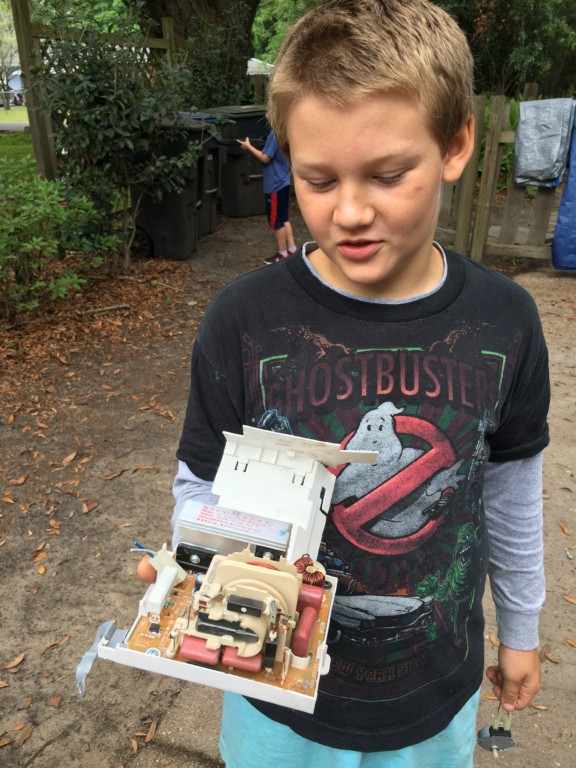
This is the latest post in our series on the center-left roots of school choice.
With a few deft twists of a screwdriver, Cyrus Grenat, 10, detached one gizmo from an old microwave and another from a vacuum cleaner. At The Magnolia School in Tallahassee, Fla., this is school work.
Cyrus isn’t tested or graded in “Taking Things Apart,” an elective of sorts where out-of-commission radios, smart phones and other gadgets are sacrificed to curiosity.
His tiny private school doesn’t do those things. It doesn’t assign much homework either. But once Cyrus gets home, the kid with the gears-turning grin and Ghostbusters T-shirt is planning to blow torch the copper out of one of his liberated components, and see if the other can be retrofitted for use in a remote-controlled car.
“It’s just fun,” Cyrus said. “I learn what’s in stuff, and how stuff works.”
With school choice in the national spotlight like never before, kids like Cyrus and schools like Magnolia could offer a lesson in how vouchers, tax credit scholarships and education savings accounts work.
And who benefits.
The K-8 school in a leafy, working-class neighborhood resists political labels. (I wish we all did.) But every year, its 60 or so students “adopt” a family affected by HIV. Its middle schoolers participate in a camping trip called EarthSkills Rendezvous. Nobody has issues with which bathroom the transgender student uses, or the school’s enthusiastic participation in National Screen-Free Week.
“We are definitely different,” said director Nicole McDermott, in an office barely bigger than Harry Potter’s bedroom under the stairs. “There are kids on the playground right now who are neurotypical, playing with kids who have autism, with kids who have social issues, with kids who have all kinds of differences. We are inclusive and diverse.”
School choice makes it even more so. The Magnolia School participates in three private school choice programs – the Florida Tax Credit Scholarship for low-income students, the McKay Scholarship for students with disabilities, and the Gardiner Scholarship, an education savings account for students with special needs such as autism and Down syndrome.* About half the students at Magnolia use them.
That has made the school and its approach accessible to a wider array of families, said Susan Smith, the school’s founder. They, in turn, have enriched the school.
“This gives us the opportunity to reach further outside our little walls, so that our community reflects more of the community our children are going to grow up in, and work in, and make their families with,” said Smith, who has master’s degrees in humanities and elementary education. “It’s part of learning. Not just who you meet, and know, but who you solve problems with, and grow up with.”
The dominant narrative about choice would have America believe it’s a boon for profiteers, a crusade for the religious right, an ideological assault on a fundamental pillar of democracy. But if critics, particularly on the left, took a closer look, they’d see a more lively story – and one that has always included progressive protagonists. “Alternative schools” like Magnolia are among them, and there’s no reason why, with expanded choice, an endless variety of related strains couldn’t bloom.
Founded in 1985, The Magnolia School doesn’t do grades, or report cards, or formal testing. (A much-debated exception was made for the standardized tests that are required by law for tax credit scholarship students. Another was made for participation in the regional spelling bee.)

Students attend classes with peers from different age groups. They get an hour or more of recess every day. There are core academic classes, but students also pick and choose from a rotating list of “guilds” that function like three-week mini-electives. This spring’s offerings include cooking, soccer, yearbook, movie making … and the gentle demolition class.
“Junk isn’t bad,” said Jatavious Alford, 10, using duct tape to re-attach wires in some kind of low-wattage medical device. “Ow!” he said when it buzzed back to life. “It pinches your fingers.”
A child-centered school that emphasizes hands-on learning is what Smith wanted. She created a blend based on many influences, including Montessori and British infant schools. Magnolia is not accredited. Most of its teachers don’t have up-to-date certifications. Smith makes no bones about it.
“For us to have to check off somebody else’s list about what makes a good school, that’s something that didn’t feel necessary or make sense to us,” she said. “I have an education degree. I’m a certified teacher. But it doesn’t take certification to be an excellent teacher.”
Magnolia grads routinely go on to excel in public high schools. Many go on to state colleges and universities, including the University of Florida and Florida State University. Some go to even more impressive schools, including Brown, Cornell, Georgetown, Vanderbilt, Julliard and MIT.
McDermott, the school’s director, is a former foster care counselor who was a Magnolia parent before she became its administrator. She said she didn’t want her 8-year-old daughter, Lilly, who has a speech disorder, separated from other students in more mainstream schools. She thought Magnolia was perfect but couldn’t afford tuition. Then she heard about the McKay Scholarship, not realizing until later it was “school choice.”
“It was just a resource and I was like, ‘Wow!’,” said McDermott.
Cyrus’s mom, Joyce Gardner, is a self-employed house painter and newly licensed real estate agent (as well as a former landscaper, yoga instructor and pastry chef). She chose Magnolia for Cyrus and his brother, Ilex, in part because of its positions on testing and play time. She said she appreciates that in lieu of report cards, its teachers put together detailed analyses of student proficiency and progress.
Cyrus struggled with reading in his early years at the school – enough that Gardner suspects he might have been at risk of retention in public school. But Magnolia nudged and nurtured him without undue pressure, she said. Now, as a fifth-grader, Cyrus is reading at an eighth-grade level. He’s starting trigonometry. And the school’s approach to learning, Gardner said, is helping he and his brother become the independent, resourceful people she wants them to be.
For what it’s worth, Gardner said she voted for Bernie Sanders in last year’s presidential primary, wanting somebody who “speaks my language.” She knows he isn’t a school choice supporter.
But “I bet he hasn’t been to the Magnolia School either.”
*The Florida Tax Credit Scholarship and the Gardiner Scholarship are administered by nonprofits such as Step Up For Students, which hosts this blog.



Thanks for article re magnolia school. I have seen students since 1985 who have soared to the heights with magnolia school’s staff’s help including two of my own children, a nephew and a granddaughter. What a delightful place to grow and mature and learn, to develop
Where it feels good to develop.
Thanks for article re magnolia school. I have seen students since 1985 who have soared to the heights with magnolia school’s staff’s help including two of my own children, a nephew and a granddaughter. What a delightful place to grow and mature and learn, to develop
Where it feels good to develop.
Hi Sue, thanks so much for the comment. I’m grateful to the school for allowing me the privilege to visit and share its story. I hope those who have concerns about school choice will pause and consider its lessons.
My children both thrived and continue to thrive as adults because of the influence of Magnolai School.
Thank you to this website who wrote this. I’ve been going to magnolia for 7 years now and I’ve made so many friends over the years and I’m glad rendezvous was mentioned to since it was such an amazing experience for me. I love this school and everything about it.